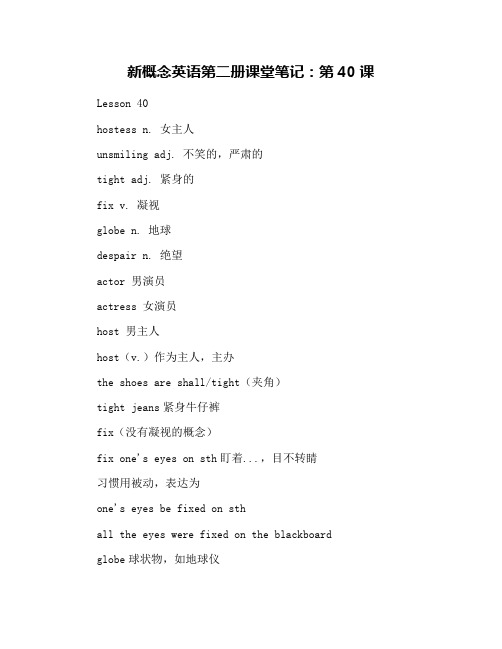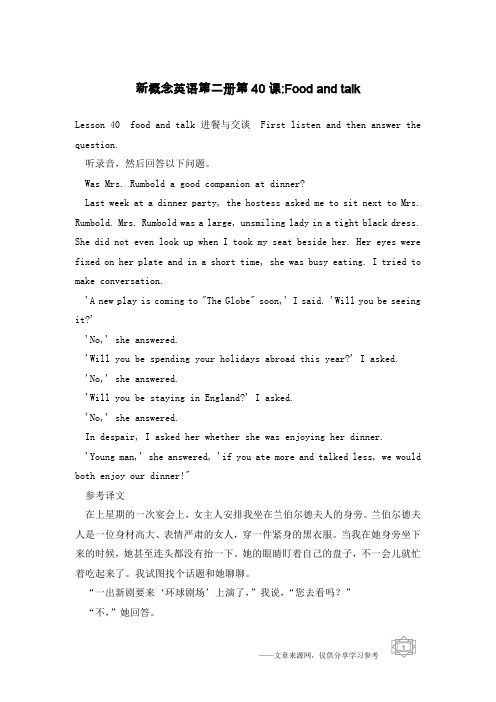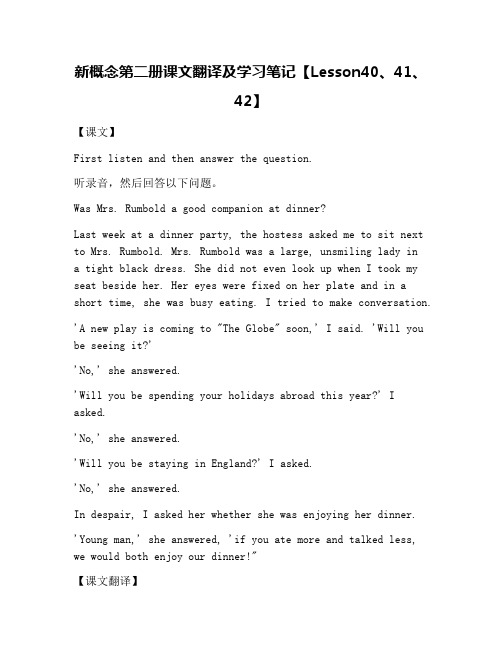新概念英语第二册笔记_第40课
新概念英语第二册:第40课课文详解及语法解析复习过程

新概念英语第二册:第40课课文详解及语法解析新概念英语第二册:第40课课文详解及语法解析课文详注 Further notes on the text1.next to, 挨着。
它既能够表示座位挨着也能够表示地理位置上挨着:Who was the man sitting next to you during the meeting?开会时坐在你旁边的那人是谁?There's a field/shop next to our house.我们家房子边上有一片田野/一个商店。
2.Mrs. Rumbold was a large, unsmiling lady in a tight black dress.兰伯尔德夫人是一位身材高大、表情严肃的女人,穿一件紧身的黑衣服。
(1)unsmiling的反义词为smiling(微笑的,喜气洋洋的)。
有些形容词前面能够加上前缀un-来表示相反的意义:comfortable (舒服的)/uncomfortable(不舒服的),true(真实的)/untrue(不真实的),interesting(有趣的)/uninteresting(无趣味的,乏味的)。
(2)in在这里表示“穿着”、“戴着”:A young man in a blue dress is inquiring for you.有位穿蓝衣服的小伙子在找您。
3.take one's seat, 在指定的位置上就座。
take a seat表示“坐下”,比sit要正式:Please take a seat.请坐。
take one's seat则表示位置事先已安排好:After everyone had taken his seat, the meeting/dinner party began.大家各自就座后,会议/宴会便开始了。
4.Her eyes were fixed on her plate and in a short time, she was busy eating. 她的眼睛盯着自己的盘子,不一会儿就忙着吃起来了。
新概念英语第二册课堂笔记:第40课

新概念英语第二册课堂笔记:第40课Lesson 40hostess n. 女主人unsmiling adj. 不笑的,严肃的tight adj. 紧身的fix v. 凝视globe n. 地球despair n. 绝望actor 男演员actress 女演员host 男主人host(v.)作为主人,主办the shoes are shall/tight(夹角)tight jeans紧身牛仔裤fix(没有凝视的概念)fix one's eyes on sth盯着...,目不转睛习惯用被动,表达为one's eyes be fixed on sthall the eyes were fixed on the blackboardglobe球状物,如地球仪global:世界的disappoint失望in despair绝望的sb./sth. is a despair of...the boy is a despair of his parents那男孩的父母对他感到绝望了the examination was a despair of me我对考试已经绝望了textFood and talkLast week at a dinner-party, the hostess asked me to sit next to Mrs Rumbold.Mrs Rumbold was a large, unsmiling lady in a tight black dress. She did not evenlook up when I took my seat beside her.Her eyes were fixed on her plate and in ashort time, she was busy eating. I tried to make conversation.' A new play is coming to" The Globe" soon,' I said.'Will you be seeing it ?'' No,' she answered.'Will you be spending your holidays abroad this year ?' I asked.' No,' she answered.' Will you be staying in England?' I asked.' No,' she answered.In despair, I asked her whether she was enjoying her dinner.' Young man,' she answered,' if you ate more and talked less, we would bothenjoy our dinner !'ask sb to do sth祈使句next to:与......相邻sit next to me 座我旁边the film will be on那部电影即将要上映用虚拟语气:1、与现在事实相反,从句使用一般过去时,主句使用would+动词原形if you ate more and talked less,we would both enjoy our dinnerif it rained,it would not be hot如果下雨,就不会这么热if you help me,i will be grateful如果你帮我,我会感激你if you helped me,i would be grateful如果你帮了我,我会感激你key structuresspecial difficultiesmake progress取得进步do business做生意do one's bestmake the bed 铺床。
新概念英语第二册单词学习Lesson40_42

新概念英语第二册单词学习Lesson40~42新概念英语第二册单词学习Lesson40host[həʊst] 女主人【单词扩充】host主人【单词例句】A: Here's to the health of our host and hostess.A:力主人夫妇的健康干杯。
B: Thanks. You are so kind.B:谢谢,你真是太好了。
serious ['sɪərɪəs] 严肃的【派生词】despairing感到绝望的【单词例句】I could feel his despair我可以感受到他绝望的情绪。
新概念英语第二册单词学习Lesson41rude [ruːd] 无孔的【单词扩充】looking-glass镜子【单词搭配】look into the mirror照镜子【单词例句】A: Is there a mirror in the room?A:这个房间里有镜子吗?B: Yes, it's behind the door.B:有,在门后面。
hole [həʊl] n.孔remark [rɪ'mɑːk] V评说remind [rɪ'maɪnd] v.提醒【单词搭配】too tight to wear 因为太紧而不能穿【单词例句】A: Here's a smaller size.A:这是小一号的。
B:These are too tight.They pinchB:这双太紧,夹脚。
【单词搭配】I remind somebody to do sth.•捉醒某人做某事【单词例句】A:I should remind you that you must be quick because I have other clients requesting to check this house later.A:我必须提醒你要快点决定,因为还有其他客户要求看这房子的。
新概念英语第二册第40课-Food and talk

新概念英语第二册第40课:Food and talkLesson 40 food and talk进餐与交谈 First listen and then answer the question.听录音,然后回答以下问题。
Was Mrs. Rumbold a good companion at dinner?Last week at a dinner party, the hostess asked me to sit next to Mrs. Rumbold. Mrs. Rumbold was a large, unsmiling lady in a tight black dress. She did not even look up when I took my seat beside her. Her eyes were fixed on her plate and in a short time, she was busy eating. I tried to make conversation.'A new play is coming to "The Globe" soon,' I said. 'Will you be seeing it?''No,' she answered.'Will you be spending your holidays abroad this year?' I asked.'No,' she answered.'Will you be staying in England?' I asked.'No,' she answered.In despair, I asked her whether she was enjoying her dinner.'Young man,' she answered, 'if you ate more and talked less, we would both enjoy our dinner!"参考译文在上星期的一次宴会上,女主人安排我坐在兰伯尔德夫人的身旁。
新概念第二册课文翻译及学习笔记【Lesson40、41、42】

新概念第二册课文翻译及学习笔记【Lesson40、41、42】【课文】First listen and then answer the question.听录音,然后回答以下问题。
Was Mrs. Rumbold a good companion at dinner?Last week at a dinner party, the hostess asked me to sit next to Mrs. Rumbold. Mrs. Rumbold was a large, unsmiling lady ina tight black dress. She did not even look up when I took my seat beside her. Her eyes were fixed on her plate and in a short time, she was busy eating. I tried to make conversation.'A new play is coming to "The Globe" soon,' I said. 'Will you be seeing it?''No,' she answered.'Will you be spending your holidays abroad this year?' I asked.'No,' she answered.'Will you be staying in England?' I asked.'No,' she answered.In despair, I asked her whether she was enjoying her dinner.'Young man,' she answered, 'if you ate more and talked less, we would both enjoy our dinner!"【课文翻译】伯尔德夫人是一位身材高大、表情严肃的女人,穿一件紧身的黑衣服。
新概念英语笔记第二册 Lesson 40 Food and tal1

hostess n. 女主人host n. 待客的主人the host nation 东道国,主办国eg. China is the host nation of the 2008 Olympic Games. 中国是2008年奥运会的主办国。
eg. Who will play host to the next Olympic Games ? 谁将是下一届奥运会的主办国?2)n. 在……上作主人,招待eg. The Parwells are such good hosts. Parwells 一家特别热情好客。
eg. He acted as host to his father’s friends. 他作为主人招待他父亲的朋友。
3)n. 旅店老板,酒店老板landlord 酒店、酒店老板; landlady 旅店,酒店女老板waiter 服务员; waitress 女服务员host 主人; hostess 女主人prince 王子; Princess 公主; actor 演员; actress 女演员hospitable adj. 乐于待客的,好客的hospitality n. 好客;殷勤待客hostile adj. 敌意的,不友好的hostility n. 敌对,敌意unsmiling adj. 不笑的,严肃的un- 否定前缀unhappy 不快乐的; unlucky 不走运的; uncomfortable 不舒服的; unsure 无把握的; unsparing 不吝惜的,不宽恕的unsteady 不坚固的,不稳的; untrue 不真实的, unused 不习惯的;smiling adj. 微笑的laughing adj. 笑的,带笑的laughing faces 笑脸be no laughing matter 不是开玩笑的事a smiling face 一个微笑的笑脸a smiling policeman 一个面对微笑的警察smile1)n. 微笑,笑容,喜色force a smile 强颜欢笑wear a smile 面带微笑eg. She was all smiles. 她满面笑容。
新概念英语第二册逐句精讲语言点第40课(2)

新概念英语第二册逐句精讲语言点第40课(2)40课 Food and TalkLast week at a dinner-party, the hostess asked me to sitnext to Mrs Rumbold. Mrs Rumbold was a large,unsmiling ladyin a tight black dress. She did not even look up when I took my seat beside her. Her eyes were fixed on her plate and in a short time, she was busy eating. I tried to make conversation. 'A new play is coming to" The Globe" soon,' I said. "Will you be seeing it ?" 'No,'she answered. 'Will you be spending your holidays abroad this year?' I asked. 'No,' she answered.'Willyou be staying in England?' I asked. 'No,' she answered.In despair, I asked her whether she was enjoying her dinner. 'Young man,' she answered,'if you ate more and talked less, we would both enjoy your dinner !'精讲笔记:4. Her eyes were fixed on her plate and in a short time, she was busy eating.她的眼睛盯着她的盘子,不一会儿就忙着吃起来了。
裕兴新概念英语第二册笔记_第40课_单词讲解

eg. We will hew out of the mountain of despair a stone of hope.
我们将把绝望的大山筑成希望的磐石。
hew [hju:]
vt (用斧、刀等)砍、劈;砍成;劈出;开辟;砍倒
despairing [dɪ’speəraɪdŋj] 绝望的
a despairing look
gaze [ɡeiz]
久久地凝视,注视(通常指因惊讶或赞赏)
look at
看
globe [ɡləub]
n 球,球状物;地球(earth);地球仪
circle the globe
环地球一圈
all over the globe
全世界
global ['ɡləubəl] adj 全球的,环球的
a global tour
vi (使)变紧;(使)绷紧;加紧
←→ loosen
tighten up a screw
旋紧螺丝钉
tighten one’s belt
省吃俭用
eg The police are tightening up on safety for the Queen’s visit. 警方为女王的来访正在加强安全保护措施。
Lesson 40
Food and talk 进餐与交谈
7-17-2014
New words and expressions
hostess
n 女主人
unsmiling
adj 不笑的,严肃的
tight
adj 紧身的
fix
v 凝视
globe
n 地球
despair
n 绝望
hostess ['həʊstɪs] n 女主人
- 1、下载文档前请自行甄别文档内容的完整性,平台不提供额外的编辑、内容补充、找答案等附加服务。
- 2、"仅部分预览"的文档,不可在线预览部分如存在完整性等问题,可反馈申请退款(可完整预览的文档不适用该条件!)。
- 3、如文档侵犯您的权益,请联系客服反馈,我们会尽快为您处理(人工客服工作时间:9:00-18:30)。
Lesson 40 Food and talk进餐与交谈Was Mrs. Rumbold a good companion at dinner?Last week at a dinner party, the hostess asked me to sit next to Mrs. Rumbold. Mrs. Rumbold was a large, unsmiling lady in a tight black dress. She did not even look up when I took my seat beside her. Her eyes were fixed on her plate and in a short time, she was busy eating. I tried to make conversation.'A new play is coming to "The Globe" soon,' I said. 'Will you be seeing it?''No,' she answered.'Will you be spending your holidays abroad this year?' I asked.'No,' she answered.'Will you be staying in England?' I asked.'No,' she answered.In despair, I asked her whether she was enjoying her dinner.'Young man,' she answered, 'if you ate more and talked less, we would both enjoy our dinner!" 参考译文在上星期的一次宴会上,女主人安排我坐在兰伯尔德夫人的身旁。
兰伯尔德夫人是一位身材高大、表情严肃的女人,穿一件紧身的黑衣服。
当我在她身旁坐下来的时候,她甚至连头都没有抬一下。
她的眼睛盯着自己的盘子,不一会儿就忙着吃起来了。
我试图找个话题和她聊聊。
“一出新剧要来‘环球剧场’上演了,”我说,“您去看吗?”“不,”她回答。
“您今年去国外度假吗?”我又问。
“不,”她回答。
“您就呆在英国吗?”我问。
“不,”她回答。
失望之中我问她饭是否吃得满意。
“年轻人,”她回答说,“如果你多吃点,少说点,我们两个都会吃得好的!”—、单词讲解New words and expressionshost1)n.待客的主人hostess 女主人the host nation 东道国,主办国例: China is the host nation of the 2008 0lympic Games.中国时2008奥运会的主办国。
Who will play host to the next Olympic Games? 谁将举办下一届奥运会。
2) n.在…上作主人,招待例: The Parwells are such good hosts.巴维尔一家非常热情好客。
He acted as host to his father's friends.他作为主人招待他父亲的朋友。
3) n.旅店的老板,酒店老板landlord男老板;landlady 女老板waiter服务员waitresshost 男主人hostess 女主人prince ['prins] 王子princess [prin'ses]公主actor 男演员actress女演员hospitality n.好客:殷勤待客hostile adj.敌意的,不友好的hostility n.敌意,敌对unsmiling adj.不笑的,严肃的un:否定前缀unhappy 不快乐的unlucky 不走运的uncomfortable 不舒服的unsure 无把握的unsparing 不吝惜的,不宽恕的unsteady 不坚固的;不稳的untrue 不真实的unused 不习惯的smiling adj.微笑的laughing faces 笑脸be no laughing matter 不是开玩笑的事a smiling policeman 一个微笑的警察a smiling face 一个笑脸smile1) n.微笑,笑容,喜色force a smile 强颜欢笑wear a smile 面带笑容例:She was all smiles.她满面笑容。
a bewitching smile 令人销魂的一笑bewitching adj.使人心醉的,使人着迷的a charming smile 妩媚的笑a grim smile狞笑grim[grim] adj.讨厌的,糟糕的;严厉的;严酷的bitter adj.充满仇恨的:令人不快的:有苦味的2) v.微笑smile at sb 对…微笑smile on sb or sth 对…表示赞成或鼓励例:She smiled at his threats.她对他的威胁一笑置之。
Fortune smiled on us. 我们交了好运.smile one's tears away 破涕为笑laugh笑,发笑(笑出声)sneer 嗤笑,嘲笑,讥笑(流露出高人一等,轻蔑的表情)grin[grin] 咧着嘴笑,呲着牙笑ridicule ['ridikju:l] 嘲弄,嘲笑laugh attight1) adj.紧的、不松的(反义词loose)a tight black dress 黑色的紧身衣a tight knot 系的很紧的结These shoes are too tight for me.这些鞋对我来说大太挤挤脚了His fingers were tight on my arm.他紧紧抓住我的手臂。
a tight schedule 紧凑的日程安排a tight match 势均力敌的比赛或a close match2)adj.小气的,憋闷的A miser is tight with his money.一个小气鬼对钱是很吝音的。
Her throat was tight with fear.她因恐怖而感到喉咙堵塞。
tighten['taitn]v.使变紧,使绷紧反义词loosentighten up a screw 旋紧螺丝钉tighten one' s belt省吃俭用例: The police are tightening up on safety for the Queen' s visit. 警方为了女皇的来访正在加强安全保护措施。
fasten 使固定blacken 使变黑whiten 使变白tighten V.使变紧是绷紧tie V.系,扎,与…打成平局tie fast 系紧fix1)V (使)固定,安装,修理,整理例: The date is not completely fixed.日期还没有完全确定Can the garage man fix over the engine?修理厂的人能修好发动机吗?He fixed up the broken chair.他修好那把坏椅子了。
2)v.全神贯注于…尤指凝视fix one' s eyes on sth 全神贯注凝视某事fix one' s attention on sth 全神贯注于或者说fix one's thought on sthStare 瞪着眼睛看,盯着看glare 怒视,恶狠狠地盯着glare at sb/sthglance:take a quick look瞥一眼,看一下gaze [geiz] 久久地凝视,注视(通常指团惊讶或赞赏)look at 看globe n.球,球状物;地球(earth);地球仪circle the globe 环地球一圈all over the globe 全世界global adj.全球的环球的a global tour 环球旅行everybody wishes for global peace.每个人都渴望全球和平。
globalize V,使…全球化globalize the economy 使经济全球化globalize the culture 使文化全球化globalization n.全球化modern adj.时髦的,现代化的modernize V.使现代化modernization n.现代化real adj.真的realize v.是成为真的realization n.实现despair n.绝望,失望(反义词hope)in despair绝望地despairingly例: He gave in to the enemy in despair.他绝望的向敌人投降了。
He left his hometown in despair.他绝望的离开了故乡。
drive a person to despair /throw a person to despair使某人陷入绝望despairing adj.绝望的a despairing look绝望的表情despairingly adv.二、关键句型Key Structuresif引导的条件句1.真实条件句:对将来可能发生的事情的假设,主句中用将来时或祈使句,从句用现代时。
例: If he is out, I' ll call tomorrow.如果他不在的话我明天再打电话吧。
You'll miss the train if you don' t hurry.要是你不抓紧的话,你就会错过火车的。
If I have time, I' ll write to him tomorrow.要是我有时间的话我明天会给他写信的。
Please don't disturb him if he is busy.要是他忙的话不要打扰他。
2.非真实条件句(虚拟语气)if从句谈论想象的情况,主句则推测想象的结果,再从句中要用动词的过去时,主句时would do,如果if从句的动词时be,那么无论从句主语是低级人称,统统用were的形式。
l) If you went to the exhibition you would enjoy it.如果你去展览的话你会喜欢的。
2) If you saw him now you wouldn't recognize him.要是你现在看到他的话你根本认不出来他。
